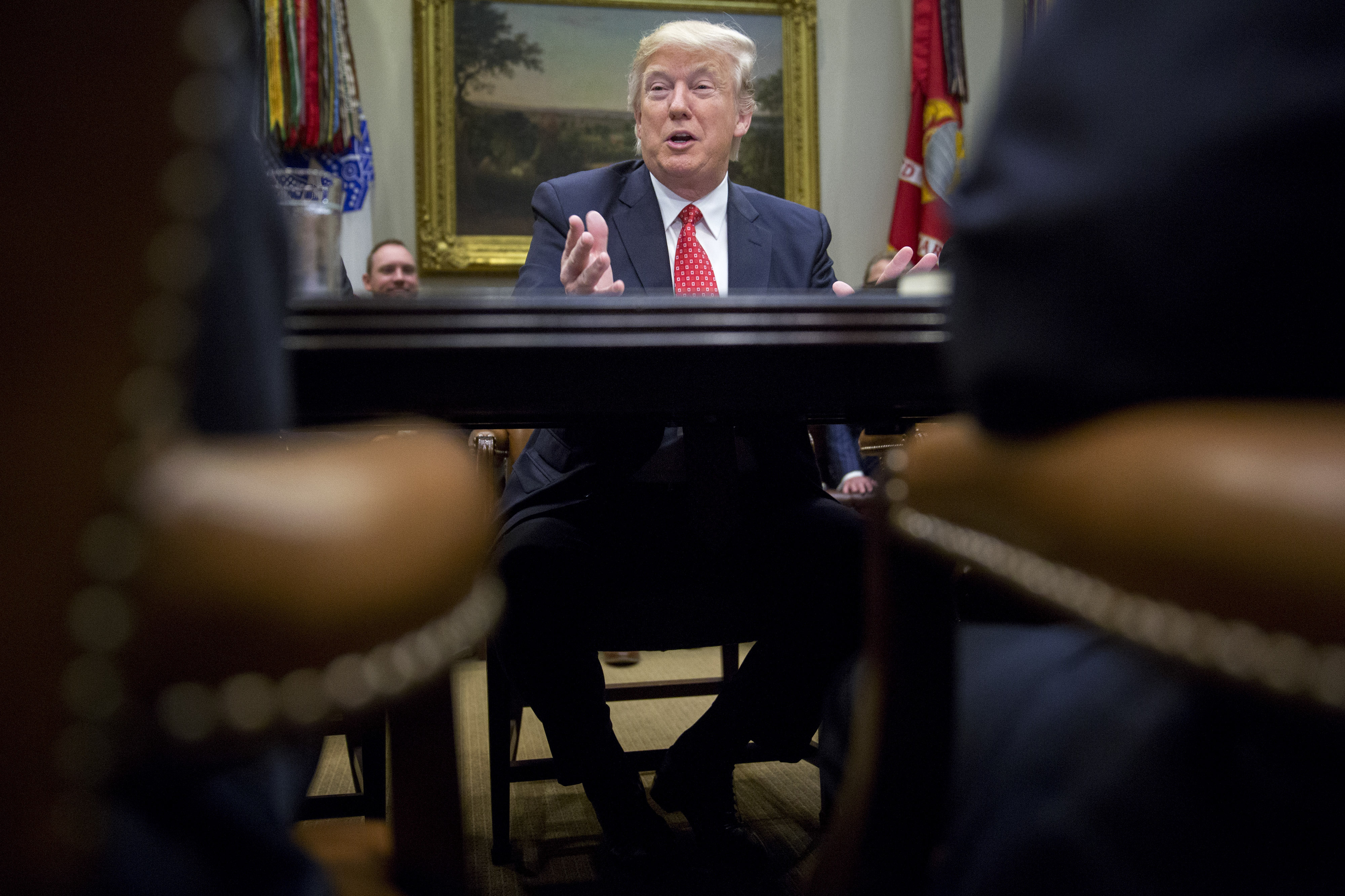President Trump has no idea how the trade deficit works
To his credit, Trump has promised to fix America's trade imbalance. Unfortunately, he clearly doesn't understand the problem.


All other things being equal, trade deficits are bad. They make it harder to create new jobs, particularly in blue-collar industries like manufacturing, and drag down wages across the economy. So, to his credit, President Trump has promised to fix America's trade imbalance.
Unfortunately, he clearly doesn't understand the problem.
Consider a change the White House is mulling to how trade data is calculated. It has to do with "re-exports" — goods that America imports, then immediately exports again without changing anything about them. Liquefied natural gas that the U.S. imports, stores, and then exports out to other buyers around the world is one example. Right now, the import is counted as an import, and the export is counted as an export, so re-exports are a wash for the trade balance.
The Week
Escape your echo chamber. Get the facts behind the news, plus analysis from multiple perspectives.

Sign up for The Week's Free Newsletters
From our morning news briefing to a weekly Good News Newsletter, get the best of The Week delivered directly to your inbox.
From our morning news briefing to a weekly Good News Newsletter, get the best of The Week delivered directly to your inbox.
The Trump administration wants to change it so the importation still counts, but the exportation doesn't. This would make the trade deficit look a lot bigger on paper. Our calculated trade deficit with Mexico would double in size, for example.
It's not clear why the White House wants this change. The cynical explanation is it's raw politics: "A larger trade deficit would give the Trump administration ammunition in arguing that trade deals need to be renegotiated, and might help boost political support for imposing tariffs," as MarketWatch noted.
The more generous interpretation is Trump's team genuinely thinks this change better reflects the economic reality of what's going on. After all, if we just turn around and resell the good again without altering it, why should it count?
But if that's their thinking, it fundamentally misunderstands why a trade deficit is a problem.
A free daily email with the biggest news stories of the day – and the best features from TheWeek.com
What creates American jobs is the flow of money through the American economy. Exports add to that flow since there's money coming in from overseas to buy goods and services from Americans. Imports subtract from that flow because we're sending money out to other countries. And when we export a re-export, somebody elsewhere in the world is still giving us money for that good.
If your complaint with the trade deficit is it makes domestic job creation harder, then not counting the "export" part of re-exports makes no sense. And if that's not your complaint, then what exactly is your problem with the trade deficit?
The other example of Trump's confusion is a more general point about the administration's salesmanship. Namely, they decry our trade deficits, but they welcome foreign investment in American jobs.
Now, there's nothing wrong with wealthy foreigners investing in the American economy per se: One dollar is as good as another. But the combination of these two stances is nonsensical, even self-defeating, because bigger flows of foreign money into America is the necessary flipside of bigger trade deficits sucking money out of America.
When we buy imports, we're sending U.S. dollars abroad. And when people in other countries get our dollars, they have two options: 1. They can use those dollars to buy something from us. But if they did that, we wouldn't have a trade deficit. 2. They can stockpile the dollars by investing them in financial assets. But dollars have to be invested in assets denominated in U.S. currency — i.e. assets that represent some sort of investment in the American economy.
Hence, a trade deficit necessitates a counterbalancing flow of foreign investment. That's why you can't really complain about trade deficits while embracing foreign investment.
Now, the Chamber of Commerce wing of the Republican Party likes to use this logic to claim that trade deficits are good, since they result in more investment. But a lower trade deficit would just mean more U.S. dollars staying in America, which would mean more Americans investing domestically as foreigners invested less. Moreover, foreign investments tend to benefit the global wealthy class while leading to stagnating wages for workers.
But this doesn't mean the Trump administration, which is generally hostile to this sort of GOP orthodoxy, is on any sounder footing.
At bottom, fixing the trade deficit (or any part of the economy) isn't too different from fixing a car engine. It's a mechanical problem and you'll only come up with the right fix if you first understand all the parts.
For instance, understanding the relationship between trade deficits and foreign stockpiles of U.S. dollars might lead you to use something called countervailing currency intervention. Those foreign stockpiles of U.S. dollars drive up the value of our currency, making our exports more expensive and widening our trade deficit. So encouraging the Federal Reserve to buy big stockpiles of assets denominated in other currencies would counterbalance that effect.
Or you could conclude that foreigners investing a lot of money in U.S. assets is great, but maybe we should give them more U.S. treasuries to invest in instead. That's because foreign investment pouring into things like real estate might lead to another financial bubble. Plus, the stimulus from putting more treasuries on the market (i.e. deficit spending) would counteract the drag on job growth produced by our trade deficit.
But if the Trump administration doesn't understand these moving parts, it's unlikely to land on either of those solutions.
Instead, the White House seems to operate according to a fuzzy, crude narrative in which global trade is all about competition and domination. They want Americans to be seen as "winning" that contest, and they want foreigners to be seen as "losing" it.
That's not only an ugly approach, it's a surefire way to make a hash of economic policy.
Jeff Spross was the economics and business correspondent at TheWeek.com. He was previously a reporter at ThinkProgress.
-
 Who is fuelling the flames of antisemitism in Australia?
Who is fuelling the flames of antisemitism in Australia?Today’s Big Question Deadly Bondi Beach attack the result of ‘permissive environment’ where warning signs were ‘too often left unchecked’
-
 Bulgaria is the latest government to fall amid mass protests
Bulgaria is the latest government to fall amid mass protestsThe Explainer The country’s prime minister resigned as part of the fallout
-
 Codeword: December 15, 2025
Codeword: December 15, 2025The daily codeword puzzle from The Week
-
 Has Zohran Mamdani shown the Democrats how to win again?
Has Zohran Mamdani shown the Democrats how to win again?Today’s Big Question New York City mayoral election touted as victory for left-wing populists but moderate centrist wins elsewhere present more complex path for Democratic Party
-
 Millions turn out for anti-Trump ‘No Kings’ rallies
Millions turn out for anti-Trump ‘No Kings’ ralliesSpeed Read An estimated 7 million people participated, 2 million more than at the first ‘No Kings’ protest in June
-
 Ghislaine Maxwell: angling for a Trump pardon
Ghislaine Maxwell: angling for a Trump pardonTalking Point Convicted sex trafficker's testimony could shed new light on president's links to Jeffrey Epstein
-
 The last words and final moments of 40 presidents
The last words and final moments of 40 presidentsThe Explainer Some are eloquent quotes worthy of the holders of the highest office in the nation, and others... aren't
-
 The JFK files: the truth at last?
The JFK files: the truth at last?In The Spotlight More than 64,000 previously classified documents relating the 1963 assassination of John F. Kennedy have been released by the Trump administration
-
 'Seriously, not literally': how should the world take Donald Trump?
'Seriously, not literally': how should the world take Donald Trump?Today's big question White House rhetoric and reality look likely to become increasingly blurred
-
 Will Trump's 'madman' strategy pay off?
Will Trump's 'madman' strategy pay off?Today's Big Question Incoming US president likes to seem unpredictable but, this time round, world leaders could be wise to his playbook
-
 Democrats vs. Republicans: who are US billionaires backing?
Democrats vs. Republicans: who are US billionaires backing?The Explainer Younger tech titans join 'boys' club throwing money and support' behind President Trump, while older plutocrats quietly rebuke new administration
